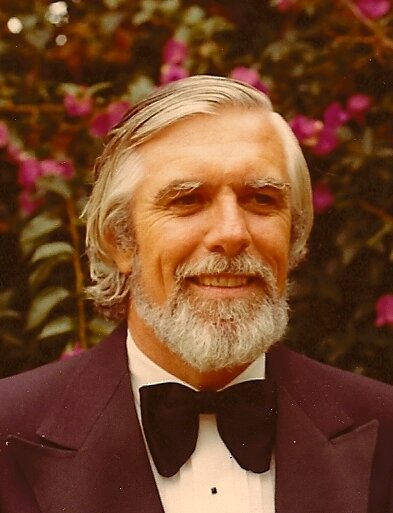More About Kildow
April 2021 — A Eureka! moment in 1973 motivated me to try to write fiction: The big, important job I held, Corporate Director of Public Relations for The Raytheon Company, was sort of fictional itself.
Raytheon lured me from a satisfying position as assistant to Dr. Jonas Salk, then the most famous person in the world by virtue of his life-saving polio vaccine. There I had replaced soon to be famous author Michael Crichton.
I accepted Raytheon’s 50% increase in salary, packed up my wife Judith, three daughters and dog, Woodstock Hoover, and moved to Boston. We settled in Newton Centre in a giant house that could have held two of our previous digs in Cardiff-by-the-Sea, although without the ocean view and ready access to a very surfable beach.
When I reported for duty at Raytheon headquarters in Lexington a surprise awaited me: The person I was hired to replace, long-time friend Jack Campbell, was still there, sitting in his large office. No one had told Jack he had been let go. For the next two years I showed up for my non-job daily, stashed myself in a small office, collected my generous pay, and began writing. Why not? Neither Jack, who stayed on in his big office, nor I, had anything to do. I was living a novel. I didn’t write about my novel work experience (must do that one day). Instead, I wrote a story based on conversations with Mexican women in San Diego, women who described horrific stories of what happened during their repeated crossings of the US-Mexican border. What befell them and their many poor friends on both sides of the border.
I submitted that novel, “The Mexican Line,” in the blind to a senior editor at Little, Brown —300 pages, laboriously typed on an Underwood upright typewriter, boxed with a letter asking for consideration. A few weeks later I got a nice letter back that praised my writing but said my novel was unbelievable — filled with tales of rapes and beatings by random men— and by policemen, on both sides of the border.
I thought the novel roman à clef.
A few years later a book and a movie, “El Norte,” successfully covered the same ground.
I stopped trying to publish. But I didn’t stop writing as I moved on to a satisfying career as a public relations counselor and management advisor, primarily in academe. I helped Nobel Laureate David Baltimore found the Whitehead Institute at MIT, served with my wife Judith, an MIT professor, as housemasters at MIT’s largest dorm, went with David when he became president of The Rockefeller University, then was recruited by the University of Southern California to help reorganize communications — and other things — in the School of Medicine. The USC gig, just temporary at first, lasted ten years.
At USC, immersed in academic disputes that, as the saying goes, are bitter because so little is at stake, I began to assemble thoughts about how important things that occurred in my multiple careers night be written about. I had, after all, been a jet fighter pilot with an unusual hitch: trained to launch an atomic bomb from my fighter.
The top secret operation in which I was engaged as a young, naïve lieutenant was a plan to conduct a sneak, paralyzing attack on China, North Korea and the Soviet Union. A simultaneous attack by several hundred nuclear-armed fighters.
The raid didn’t occur, fortunately, but my novel, “Fallout: remains of an atomic war,” did surface. I sent it around in draft form to a few agents, and to a publisher or two, but never heard back. Not even a courtesy card. Talk about your top secret.
So I self-published with Amazon, did no marketing, sold probably a few dozen books and an unknown number of Kindle free reads. It continues to be purchased, a few each month.
My preoccupation with war led me to examine what happened when some 30,000 veterans of World War I and their families marched on Washington in 1932. All deep in poverty, nearly all had lost their homes. It was the onset of the Great Depression. The veterans were promised a desperately-needed bonus for their service. President Hoover sicced the army on them. Guns were fired, gas spewed, the hovels in which they huddled burned to the ground.
I imagined the aftermath for one of those families, how that veteran got to that point. I called it “Exiles: a curveball called destiny,” concluding that the need to wage war is a disease.
I was born in January 1933 in San Diego. You can do the math and figure out I’m no spring chicken. But at my advanced age I continue writing, and sharpening my focus on stories I deem need to be told. Not lovely stories of passion fulfilled, or mysterious forces from outer space. I’m looking at what’s happening here, now, so:
My third novel, “Prelude to a sting,” which appeared in fall 2020, follows two young women. It examines what happens to gifted young women inside MIT, how they play important roles in expanding women’s rights, and how these two young women pioneer a successful computer company.
Successful pioneers — even though both were raped as children.
The story is built upon experiences Judith and I had when we were housemasters at MIT, where young women had a tough time with aggressive males. A few not only survived, but thrived. “Prelude” imagines one of the latter.
My latest novel, “Chandelle,” is described in detail elsewhere on this site. It’s a love story in wartime, or more accurately, wartimes. It explores what it’s like to be a hero.
